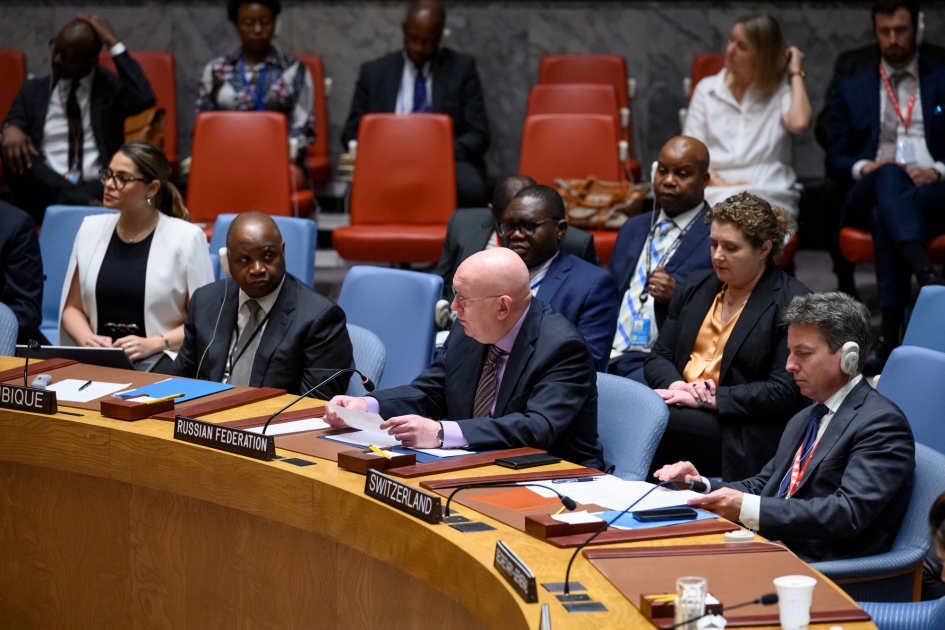Statement by Permanent Representative Vassily Nebenzia at UNSC briefing on Mali
Mme.President,
We thank SRSG Wane for the briefing. We welcome Mr. Abdoulaye Diop, Minister for Foreign Affairs and International Cooperation of Mali to this meeting.
Without exaggeration, the situation in Mali remains complicated. Terrorists from the “Islamic State in the Greater Sahara” and the “Support Group for Islam and Muslims” have intensified their subversive activities. Attack against civilians, Malian military, and the Blue Helmets continue. Extremist groups are engaged in an armed confrontation against one another.
Exacerbating terrorist threat triggers humanitarian degradation. By the UN data, almost 9 million people in Mali are in need of various forms of humanitarian assistance. Mali’s humanitarian appeal remains chronically underfunded, which adds to the humanitarian calamity. We call on Bamako's international partners to stop politicizing donor assistance, which was why the financing of support programs in Mali was suspended. Such decisions affect the civilians in the first place. On our part, we continue providing food assistance to Mali, both bilaterally and via the WFP channels.
Though the situation is difficult, Malian authorities have made significant efforts to restore constitutional order in the country in accordance with the ECOWAS-endorsed modalities. The transitional roadmap is being implemented, the new territorial division of the country has been approved and Independent Electoral Management Authority has been operationalized. The military are already voting in the framework of the constitutional referendum, the main date for which is 18 June. We wish Bamako every success in organizing a free and democratic expression of the will of its citizens.
Malian leadership continues to demonstrate its commitment to the Algiers Peace Agreement, which provides basis for ensuring lasting peace and national accord. In this context, we cannot fail to mention the trip of Ismaël Wagué, Minister of Reconciliation, Peace and National Unity of Mali, to Kidal in May this year. Despite the suspension of the Monitoring Committee, the Tuareg movements are still ready to reach agreements with the authorities. It is important that the signatories to the Algiers Peace Agreement show flexibility and a willingness to compromise in the national interests.
Against the “security vacuum” that emerged after the inglorious withdrawal of the French operation Barkhane and the EU operation Takuba, the government of Mali has been developing legitimate cooperation with international partners who are capable of providing assistance in ensuring security and protecting the population. Among others, thanks to the Russian support, the armed forces of Mali were able to build capacity in countering the terrorist threat and convert this potential into concrete results on the ground. In particular, from February to March this year, the Malian army held 59 successful operations against terrorists in the central region of the country. Besides, as noted in the recent Secretary-General’s report, among the results that Malian army achieved was a decrease in the number of civilian casualties.
A strong negative reaction of some states to the enhancement of Malian-Russian cooperation is a manifestation of neo-colonial approaches and double standards. We need to be helping the authorities in Mali effectively rather than “poking sticks into spokes”. Unfortunately, this is exactly what Paris is doing together with its allies and with the help of some levers in multilateral mechanisms.
From this perspective, the May report of the OHCHR on the events in Mura in March 2022 looks like another attempt to discredit the efforts of Bamako in countering terrorism. It is clear (and Malians already stated it officially) that the report was biased. At the very least, we should first wait for the results of the national investigation by Mali.
We note the efforts of the UN Multidimensional Integrated Stabilization Mission in Mali (MINUSMA). We are aware of the threats that peacekeeping service poses to personnel, and we honor the memory of peacekeepers who gave their lives while bringing peace and security to Mali. We extend condolences to the government of Burkina Faso, whose Blue Helmets died in an attack on 9 June, and we wish speedy recovery to the injured. Close coordination with the host country and respect for the sovereignty of Mali are necessary so MINUSMA can fulfil its tasks successfully.
In the light of the discussion that has already begun in the Security Council on the renewal of the mandate of MINUSMA, we would like to remind that the Malians expressed their dissatisfaction with the reconfiguration options proposed by the Secretary-General in the Strategic Review of the Mission. Indeed, the main problem is not the number of peacekeepers, but the functions they perform. One of the key tasks for the government of Mali is fight against terrorism, which is not covered by the mandate of the Blue Helmets. A fundamental element of the existing mandate is the protection of civilians and the provision of appropriate assistance to Mali. Excessive focus on internal political and human rights aspects in peacekeepers’ activity affects how they perform their fundamental tasks of maintaining peace and security in the country.
As for options for reformatting the mandate of MINUSMA, we believe that any proposals to change the Mission’s modalities should be based on the opinion of the host state.
Russia will continue to provide Mali with comprehensive assistance, including to enhance the country’s ability to respond to security challenges. Our bilateral interaction is taking place at Bamako's request and is fully compliant with the applicable norms of international law. We will continue promoting the normalization of the situation in Mali constructively, within the framework of the Security Council, which directly meets the interests of achieving lasting peace and stability throughout the Sahara-Sahel region that is still suffering the consequences of the 2011 turmoil in Libya.
We are firmly convinced that the people of Mali have a leading role to play in stabilizing their home country.
Thank you.
